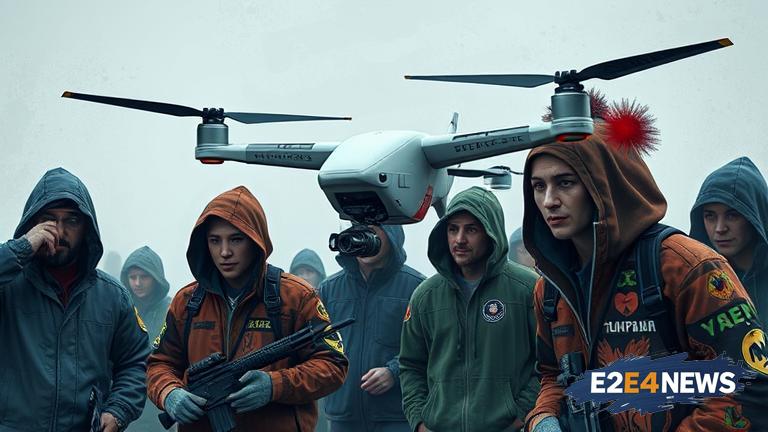A group of Russian rappers has been accused of glamorizing Ukrainian drone explosions in their music, sparking a heated debate about the role of art in wartime. The rappers, who have not been named, have been criticized for their lyrics, which appear to glorify the attacks and downplay the harm caused to civilians. The controversy has sparked a wider discussion about the impact of music on public opinion and the responsibility of artists to consider the consequences of their words. The Ukrainian government has condemned the rappers, saying that their music is a form of propaganda that undermines the country’s efforts to defend itself against Russian aggression. The Russian government has also weighed in, with some officials defending the rappers’ right to free speech while others have criticized their lyrics as insensitive and irresponsible. The debate has highlighted the complex and often fraught relationship between art and politics, particularly in times of conflict. Many have argued that music and other forms of artistic expression can be a powerful tool for social commentary and critique, but others have countered that artists must be mindful of the potential consequences of their words and actions. The controversy has also raised questions about the role of social media in amplifying and perpetuating divisive and inflammatory content. Some have called for greater regulation of social media platforms to prevent the spread of hate speech and propaganda, while others have argued that such measures would be an infringement on free speech. The situation has been further complicated by the fact that the rappers in question have a significant following in Russia and have been praised by some for their patriotism and support for the Russian military. However, others have criticized their music as nationalist and xenophobic, and have accused them of promoting a dangerous and intolerant ideology. The debate has sparked a wider conversation about the state of Russian society and the role of nationalism and patriotism in shaping public opinion. Some have argued that the controversy reflects a deeper societal problem, in which nationalist sentiment is often prioritized over human rights and the well-being of minority groups. Others have countered that the rappers are simply reflecting the views and attitudes of their audience, and that their music is a legitimate form of expression and dissent. The situation has also highlighted the challenges of navigating complex geopolitical conflicts through art and music. Many artists have struggled to find a way to address the conflict in Ukraine in a way that is both nuanced and respectful, and some have been criticized for their attempts to do so. The controversy has sparked a wider discussion about the importance of empathy and understanding in times of conflict, and the need for artists and musicians to approach these issues with sensitivity and respect. Ultimately, the debate surrounding the Russian rappers has highlighted the complex and often fraught relationship between art, politics, and society, and has raised important questions about the role of music and other forms of artistic expression in shaping public opinion and promoting social change. The situation is ongoing, and it remains to be seen how the controversy will be resolved. However, one thing is clear: the debate has sparked a wider conversation about the importance of responsible and respectful artistic expression, and the need for artists and musicians to consider the potential consequences of their words and actions. The Ukrainian government has announced plans to take legal action against the rappers, and it is likely that the controversy will continue to unfold in the coming weeks and months. As the situation continues to develop, it is clear that the debate surrounding the Russian rappers will have significant implications for the music industry and beyond. The controversy has highlighted the need for greater awareness and understanding of the complex geopolitical conflicts that are shaping our world, and the importance of approaching these issues with sensitivity and respect. It has also raised important questions about the role of art and music in promoting social change, and the need for artists and musicians to consider the potential consequences of their words and actions. The situation is a reminder that music and other forms of artistic expression have the power to shape public opinion and promote social change, but also that they can be used to perpetuate harmful and divisive ideologies. As the debate continues to unfold, it is clear that the controversy surrounding the Russian rappers will have significant implications for the music industry and beyond.
